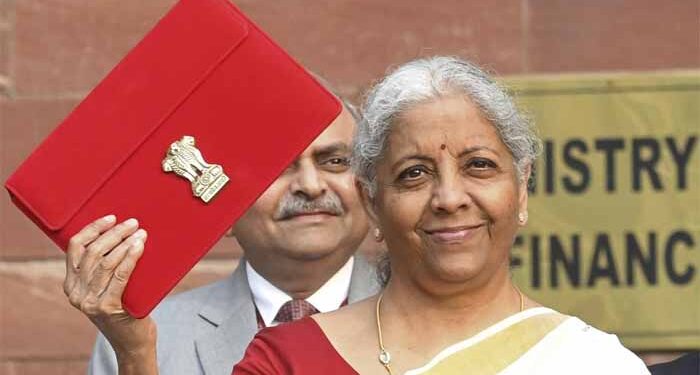- Finance Minister announces income tax exemption for people earning up to ₹12 lakh per annum
- Bharat Bhasha Scheme will enable students to grasp subjects better in their Mother Tongue
- A ‘perfect jugalbandi’ of consumption and investment, says Anil Agarwal, Chairman, Vedanta Limited
NE BUSINESS BUREAU
AHMEDABAD, NEW DELHI, MUMBAI, FEB 1
Finance Minister Nirmala Sitharaman on Saturday presented Union Budget 2025, her eighth consecutive budget, focusing on key pillars of education, infrastructure, youth, farmers, women, economically disadvantaged, middle-class, MSMEs, start-ups. This will help in boosting business of companies in banking, IT, manufacturing, retail, pharmaceuticals, finance, AI, EV, automobile sectors.
Industry leaders hailed the FM for striking a fine balance between fiscal prudence, economic stimulus and a ‘perfect jugalbandi’ of consumption and investment.
Finance Minister announced income tax exemption for people earning up to ₹12 lakh per annum.
Here are some of the reactions from captains of all sectors.
Visionary launchpad for ‘Heal in India’
Dr. Prathap C Reddy, Founder and Chairman, Apollo Hospitals, said, “Now, Budget 2025 serves as a visionary launchpad for ‘Heal in India,’ creating the roadmap to establish India as a global center for advanced healthcare and medical innovation. The expansion of medical education with 75,000 additional medical seats over the next five years, coupled with the launch of Centers of Excellence in AI, will foster innovation in health-tech and expand R&D investments. The announcement to promote medical tourism through private sector partnerships will enhance our capacity to attract global patients and position India as the go-to destination for affordable, world-class medical care under the ‘Heal in India’ mission. With support for capacity building and streamlined visa processes, this initiative will ensure India not only heals its citizens but also helps heal the world.”
Funds of funds for startups will drive innovation

Rishabh Jain, President, Swarrnim Startup and Innovation University, said: “The 2025-26 India Budget provides a major boost to the startup ecosystem with a Rs 10,000 crore allocation of a new Alternative Investment Fund (AIF). This complements the existing Fund of Funds (FoF), which has garnered Rs 91,000 crore in commitments, strengthening the government’s push to drive innovation and growth in India’s entrepreneurial landscape. Startups have faced capital constraints, especially in early stages. The extension of Section 80-IAC benefits for five more years, alongside the Rs 10,000 crore Fund of Funds, will support growth in critical sectors like renewable energy, healthcare, and deep tech. This budget positions India as a global hub for innovation, with venture capital inflows expected to double to $20 billion by 2026.”
Move to provide relief to the middle-class will stimulate spending
Vaibhav Jajoo, Advocate (CA), Dhruva Advisors LLP, said: “From a direct tax perspective, the relief and changes in tax slab rates are welcome measures. Notably, income up to Rs. 12.75 lakhs (including a standard deduction of Rs. 75,000) has been made tax-exempt under the new tax regime. This does not apply to the special rate income such as capital gain. Additionally, tax slabs have been restructured, resulting in tax savings ranging from Rs. 80,000 to Rs. 1,10,000. This was unexpected but is a significant and welcome move to provide relief to the middle class and stimulate spending in the economy. Nevertheless, several customs duty rates have been reduced or exempted, particularly in the pharmaceutical sector, benefiting the public at large, along with reductions in duty in other sectors to support domestic industry growth.”
Bharat Bhasha Scheme will enable students to grasp subjects better
Vishal Chiripal, Managing Director, Shanti Education Initiatives Ltd, said: “The Union Budget for 2025-2026, outlines an ambitious roadmap for India’s growth. With the government’s focus on Viksit Bharat 2047, several key decisions have been made to empower youth of India at the grass root level. One of the significant announcements is the Bharat Bhasha Scheme, which aims to provide Indian language books in digital format for schools and higher education institutions. This initiative will enable students to grasp subjects better in their native languages, ensuring accessibility to quality education for all. In line with advancements in technology-driven education, a Centre of Excellence in AI for Education will be set up with an allocation of ₹500 crore.”
₹1.1 lakh crore Urban Challenge Fund will drive city redevelopment
Kamal Singal, MD & CEO, Arvind SmartSpaces Ltd, said: “The Union Budget 2025-26 lays a strong foundation for urban transformation, with ₹1.1 lakh crore Urban Challenge Fund driving city redevelopment, infrastructure upgrades, and sustainable growth. The continued support for housing through the SWAMI scheme and SWAMI Fund 2 will accelerate project completions and boost home buyers’ confidence. At Arvind SmartSpaces, we welcome these initiatives, which align with our vision of building future-ready urban communities. This budget paves the way for a more dynamic and resilient real estate landscape.”
A ‘perfect jugalbandi’ of consumption and investment
Anil Agarwal, Chairman, Vedanta Limited, said: “I am delighted that mining is one of the 6 domains identified for transformational reforms over the next 5 years. Along with mining, agriculture is also a priority, particularly with the goal of achieving self-sufficiency in areas like edible oils. Mining, agriculture, manufacturing (including electronics, which is a thrust area for the government) can all help increase domestic production, reduce imports and create millions of good jobs in India. I congratulate the PM and FM for a visionary Budget which has stimulated the perfect jugalbandi of robust consumption growth and accelerated investment – the keys to a #ViksitBharat.”
Growth, investment & tax cuts to drive India’s economic surge

Ashishkumar Chauhan, MD and CEO, NSE, said: “The budget builds on India’s growth momentum with strong development measures, continued fiscal prudence, increased capex and reduced tax burden. Increase in disposable income enhances consumption growth and provides further wealth creation opportunities to Indian households through the markets. More and more people will join the pool of current 11 crore unique investors and will become stakeholders and beneficiaries of India’s growth journey thereby supporting a virtuous cycle of economic growth, capital formation and job creation. Through a slew of social welfare measures on employment, education, healthcare, women empowerment and with special support to youth, farmers, MSMEs and start-ups – the budget focuses on India’s most important resource – its people.”
Focus on Garib, Youth, Annadata and Nari is truly commendable

Dr Meenesh Shah, Chairman, National Dairy Development Board, said: “Union Budget 2025-26 reinforces importance of agriculture, dairy and allied sector in spurring development and prosperity in the lives of our rural households. Focus on Garib, Youth, Annadata and Nari (GYAN) is truly commendable as the vision of inclusive Viksit Bharat will be achieved only through concerted interventions with this segment. Government has once again underscored vital role of cooperatives with support to NCDC for lending operations which will improve financial access for cooperatives, fostering their growth and sustainability. The launch of a Comprehensive Programme for Vegetables and Fruits to promote production, efficient supply chains and remunerative pricing is a significant step toward enhancing farmer incomes. NDDB along with its subsidiaries is already working in this segment and this fillip will help increasing farmers’ income.”
A watershed moment for India’s real estate landscape
Shekhar G Patel, Managing Director & CEO, Ganesh Housing Corporation Limited, said: “The 2025 Union Budget marks a watershed moment for India’s real estate landscape. The government’s strategic focus on affordable housing and commercial infrastructure development is particularly noteworthy. The expansion of GCCs into tier-two cities isn’t just a business decision – it’s reshaping our urban landscape. We’re witnessing unprecedented demand for Grade A office spaces in cities that weren’t on our radar five years ago. Additionally, the Udaan scheme’s focus on regional air connectivity is a game-changer for real estate markets in emerging cities.”
Budget to fortify manufacturing, MSMEs, and domestic consumption
Gautam Singhania, Chairman & Managing Director, Raymond Group, said: “The decision to exempt income tax up to ₹12 lakh is a game-changing reform that boosts India’s middle class by increasing disposable income. This is expected to drive household spending—an essential growth engine for sectors like retail and real estate. Higher discretionary spending signals economic vitality, fueling consumption-led growth and strengthening market dynamics. The Union Budget 2025-26 builds on this reform with targeted measures to fortify manufacturing, MSMEs, and domestic consumption. Enhanced credit access, sector-specific incentives for textiles and apparel, and streamlined compliance are set to boost industrial output. With the middle class now driving nearly 60% of domestic consumption, rising purchasing power is likely to accelerate demand for aspirational and premium products. This holistic strategy positions the economy for sustained expansion by creating a strong synergy between consumer spending, industrial growth, and workforce empowerment.”
It aims to accelerate self-reliance in wind and solar manufacturing
Girish Tanti, Vice Chairman, Suzlon, said: “The Government budget seems to be a significant step towards achieving India’s ambitious energy goals. By strengthening Aatmanirbhar Bharat across manufacturing and agriculture, with a focus on clean tech, wind, solar, EV, and battery storage, the budget aims to accelerate self-reliance in wind and solar manufacturing. The National Manufacturing Mission’s targeted support for all renewable energy sources is a welcome move, as it reinforces India’s commitment to a level playing field and ambitious energy goals. The expected outcomes are promising: surpassing the 500 GW target and creating nearly 3 million green jobs. Additionally, incentives for electricity distribution reforms and intra-state transmission upgrades will likely improve the financial health of power companies and enable better grid integration of renewables. This comprehensive approach should have a positive impact on India’s economy and population.”
Budget focusses on improving the ease of doing business
Sakshi Gupta, Principal Economist, HDFC Bank, said: “Addressing concerns around slowing demand from the middle class, the budget rationalised personal income tax slabs across the board along with revision in the limits of the tax deducted at source. This is likely to spur consumer demand and savings by the middle class that has faced challenges from elevated inflation and lower income growth. Beyond the sops for the common man, the budget focusses on improving the ease of doing business through a “light touch” regulatory approach. The next five-year fiscal strategy has been geared towards promoting agriculture, MSMEs, exports and promoting greater participation from the private sector in India’s capacity building going forward.”
Budget strengthens 3 critical pillars of the FMCG sector
Aasif Malbari, Chief Financial Officer – Godrej Consumer Products Ltd, said: “The Union Budget 2025 takes a balanced approach by strengthening rural infrastructure, manufacturing, and consumer spending—three critical pillars for the FMCG sector. Investments in rural development and job creation will boost economic activity and drive higher consumption, opening new opportunities for market expansion. The National Manufacturing Mission is a strong step toward enhancing domestic production, reducing import dependencies, and improving cost efficiencies. Additionally, tax reforms benefiting the middle class will increase disposable income, further fueling demand across essential and aspirational FMCG categories. Overall, the Budget lays a strong foundation for a more consumption-driven economy, creating significant growth opportunities for the FMCG industry.”
We hail move to exempt lifesaving medicines from customs duty
Nirav Mehta, CEO & Managing Director, CORONA Remedies, said: “This year’s budget is a welcome move to enhance accessibility of lifesaving drugs and medicines in India. The exemption of basic customs duty on certain drugs under patient assistance programs is an encouraging boost for the pharmaceutical industry. We also welcome the government’s move to exempt lifesaving medicines from customs duty which will enhance the overall affordability of drugs in India this progressive move promotes India to achieve its aim of becoming a global pharmaceutical leader while also making essential treatments more accessible to patients suffering from chronic and severe diseases such as cancer and uncommon ailments.”
Tax sops for GIFT City IFSC will attract global investors
Tapan Ray, MD & Group CEO, GIFT City, said: “The Union Budget 2025 reinforces the government’s commitment to making GIFT City IFSC a global financial hub. The proposed tax incentives and regulatory simplifications will attract global investors, fund managers, and businesses, strengthening India’s financial ecosystem. With these measures, GIFT City is set to become a competitive and business-friendly destination on the global financial map. It will play a key role in driving India’s growth in the international financial services sector.”
National Mission for Edible Oilseeds will make country self-reliant in edible oil

Priyam Patel, Managing Director, NK Proteins Pvt Ltd, said: “The government’s renewed push for Aatmanirbharta in edible oils through the National Mission for Edible Oilseeds is a crucial step toward reducing India’s import dependence. This will empower farmers with better seeds, infrastructure, and access to credit. The National Mission on High Yielding Seeds further complements this vision by improving productivity and climate resilience. Together, these initiatives will stabilise edible oil prices and boost domestic production. With the added tax relief for the middle class, higher disposable incomes will drive demand, benefiting both agriculture and the food industry. This Budget fuels sustainable growth across the value chain.”
Retail, automobiles and housing sectors set to grow faster
Pravin Patel, Chairman, HOF Group, said: “The reduction in personal income tax rates is a welcome move that puts more money into the hands of people, which will fuel consumption and savings. By raising the tax-free income limit to Rs. 12 lakh, the government has ensured that the middle class has greater spending power. This will drive demand across key sectors such as retail, automobiles and housing, creating a positive ripple effect on the economy. The government’s focus on MSMEs, with revision in classification criteria and significant enhancement of credit availability with guarantee cover will boost the growth of MSMEs. The National Manufacturing Mission covering small, medium and large industries for furthering “Make in India” is also a step in the right direction.”
FM strikes a fine balance between fiscal prudence & economic stimulus
Sanjay Singal, CEO, Wagh Bakri Tea Group, said: “The finance minister has struck a fine balance between fiscal prudence and economic stimulus. The increase in the tax-free income limit to Rs. 12 lakh will significantly boost consumer spending. This move is expected to drive demand across FMCG and various sectors and accelerate the Indian economy. The budget also focuses on the agriculture sector, with initiatives for enhancing agri output, crop diversification, and many more to enhance farmers’ earnings. The host of measures announced for supporting MSMEs, boosting exports, and enhancing Ease of Doing Business by reducing compliance burden will go a long way in furthering ‘Make in India’.”
FM places strong emphasis on education, research and skilling

Manjula Pooja Shroff, Founder and CEO of Kalorex Group, said: “Finance Minister has placed a strong emphasis on education, research and skilling. The announcement of 10,000 fellowships for technological research in IITs and IISc with enhanced financial support under the PM Research Fellowship scheme will boost innovation. The capacity expansion of IITs and medical colleges, and setting of a Centre of Excellence in AI for Education and National Centres of Excellence for Skilling are need of the hour. Setting up 50,000 Atal Tinkering Labs in five years will promote curiosity and innovation in the young minds. There is also a focus on startups and skilling, which will go a long way in promoting entrepreneurship.”
The budget lays a strong foundation for economic growth
Kshitij Patel, Managing Partner, Manubhai & Shah LLP, said: “This budget can yield several benefits for the long term. By simplifying tax structures, reducing compliance burdens, and streamlining TDS/TCS norms, the government has made doing business in India significantly easier. These reforms will encourage both domestic and foreign investments. The rationalisation of income tax slabs, with no income tax up to income of Rs. 12 lakh is a much-awaited and welcome relief. However, we will have to wait and see what is in store in the new Income Tax Bill that will be brought next week. Simplified KYC norms and credit support for MSMEs and startups will ensure smoother access to capital, empowering businesses to grow and innovate in a thriving economic environment. Overall, the budget lays a strong foundation for economic growth.”
Raising the FDI limit in insurance to 100% will attract global players
Mihir Parikh, Founder and CEO of MP Financial Services, said: “The finance minister has heard the middle class and given significant financial relief by hiking income tax exemption limits. This will not only give a boost to domestic demand but also lead to enhanced investments, which in turn will spur the economy. At the same time, the budget has pegged the fiscal deficit at 4.4% of the GDP, indicating fiscal prudence. Raising the FDI limit in insurance to 100% will attract global players, leading to greater competition, better products, and improved financial security for citizens. The budget has identified tourism as a key sector. The development of top 50 tourist destination sites, improving ease of travel and connectivity and introducing streamlined e-visa facilities along with visa-fee waivers for certain groups also augur well for the growth of domestic tourism.”










